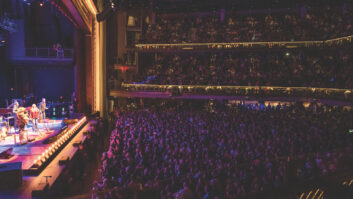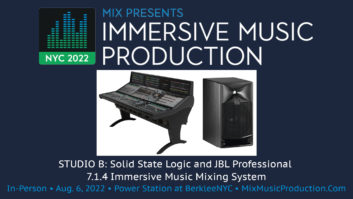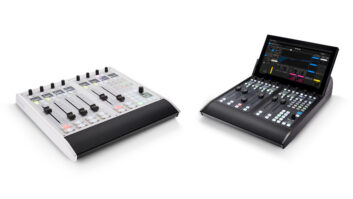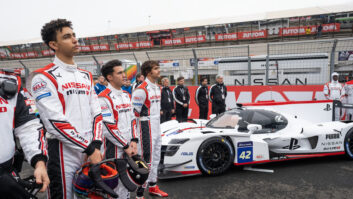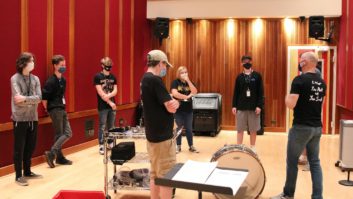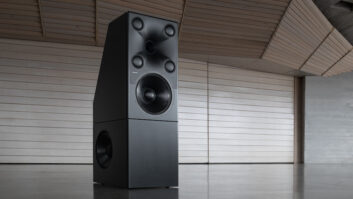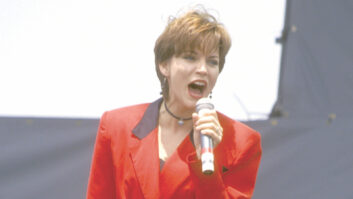Nestled in Chicago’s booming, funky “Bucktown,” a studio has emerged from the landscape of Generation X clubs, bustling restaurants and the screech of taxicabs. Engine Studios planted its roots in a three-story loft to develop local talent and replenish the music scene.
In March of this year, Engine Studios opened the doors that once belonged to Idful Studios, which Brad Wood owned and operated from 1988 to 1997. Toward the end of ’97, John Humphrey took over as studio manager and serves in the same capacity at Engine Studios. “Brad used to record a couple of bands that I was in way back in the late ’80s and ’90s,” Humphrey says. “He was a freelance engineer who ran a studio, and we had mutual acquaintances who turned me on to him as producer. He ended up making four records for my band [God in Texas] back then, and we just started up a friendship that way.”
It seemed a natural step to join forces and create a larger studio. “That is where Jep [Thornton, owner of Engine Studios] had come into the picture to help us build this facility,” Humphrey says. Longtime Chicago-area studio designer John Peluso, owner of Custom Engineering, designed the studio. After some time, Wood stepped out, and Thornton and Humphrey went ahead and built the studio, though Wood is not entirely out of the picture; he still works as a freelance producer and contributes ideas. “Essentially, Jep is the owner and I’m the manager,” Humphrey says. “It just started out as one other studio, and it kind of morphed into this much larger facility over three years and a series of events.”
Engine Studios, like its predecessor, works mainly with local talent. “The music scene here is as fickle and unpredictable as anywhere else in the country,” Humphrey explains. “But I think that there is a really large underground – as in not major label – scene here that we generate a lot of business from. We do a lot of independent label projects.”
And Bucktown is the place to do it. This area began its transformation from industrial community to hip neighborhood only five years ago. “Bucktown, Chicago, is like the neighborhood,” Humphrey says. “If you were a musician coming in from out of town, this is the place to go. You can walk out of here and you’re 25 feet away from 30 restaurants and nightclubs.”
The studio consists of a control room, live room and two other studios, B and C. The main control room is just as large as the “A” studio, housing two Studer 820s, a fully loaded Pro Tools 5.0 system, Genelec 1039 wall monitors, Genelec 1030 near-field monitors, and a variety of new and vintage outboard gear. “We wanted to create a control room that had a lot of space, was really comfortable to work in for long periods of time,” Humphrey says. “There are actually three rooms that incorporate the `A’ room. There is the main tracking room, with another smaller tracking room that also doubles as a sound lock, but is capable for drums and guitars. There is a third room that is also a pretty large isolation booth, where you can get a full drum kit in there.”
The entire studio was wired so that an artist can record from any studio to any control room, with eight mic lines that can be cross-patched through the facility. “We’ve got three studios inside this 6,200-square-foot map,” Humphrey says. “We really tried to maximize the use of the space.” The studio also has a wide variety of mics. According to Humphrey, one of their silent partners is a microphone collector, whose closet contains more than 100 vintage and new models. “We’ve got three Neumann 367s here, and there were 105 of them ever made,” Humphrey says.
“We just recently installed the Amek 9098i,” he continues. “We were looking for a console that was modern but also provided all of the things we liked about old analog consoles. I just basically like the tone; passing audio through it creates a certain characteristic that I think you don’t get from a lot of other boards.”
Engine Studios recently wrapped up a recording session with local act Gaza Strippers (Lookout Records), one of their bigger projects this year. “It was pretty exciting to go in there and see [the lead singer] do an old-school, straight-up analog rock recording that just sounds killer,” Humphrey says. “For me, it is just interesting to see that stuff going on when a lot of people in this day and age are kind of getting away from that type of recording. Just going in live and just doing straight to analog tape.
“We’ve got analog tape machines in all the rooms,” Humphrey says. “For our genre stuff, the people we’re aimed at, analog tape is still really viable. We still really love the sound of it. Of course, we’re ready to go to digital, but we like to keep both around. I have to see what the future dictates.”
